Noses On! Per Scholas Among 2022 Red Nose Day Grantee Partners
Per Scholas is honored to be among this year’s Red Nose Day grantee partners through a matching grant partnership with Comcast NBCUniversal! In its eighth year, Red Nose Day is a beloved fundraising event by Comic Relief US to help end the cycle of child poverty and ensure a healthy, empowered future for all children and youth. Per Scholas helps change trajectories by preparing our learners, many of whom are youth or have children, to launch life-changing careers in technology by participating in our rigorous, cost-free tech skills training.
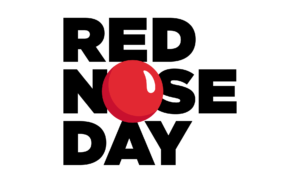
As we train our learners to start a career in tech through IT support, cybersecurity, software engineering, and more, we prepare individuals to have a well-rounded skill set that creates economic equity and financial stability for their families.
Per Scholas Chicago Graduate Veronica Vergara applied to Per Scholas to create her own path of opportunity that was flexible so she could be available for her daughter, if needed. Veronica’s daughter suffered from serious health problems previously, so she quit work to focus on her daughter’s health. A year and a half later, Veronica’s daughter’s condition had greatly improved, and Veronica began preparing to rejoin the workforce. Her husband worked in IT and she admired many features of his job, including its flexibility and good pay, which is why she applied to Per Scholas to launch her IT career.
Another example of how Per Scholas’s cost-free tech training has enhanced our learners’ lives and the lives of their children is through Sadaf Haroon, a Per Scholas Dallas Software Engineering graduate. Sadaf, an immigrant mother of three, was at first intimidated to resume a career in the thriving field of tech. “Per Scholas made it easier for me to learn and now I am an earning member of my family. What can be greater than that?”
In the two years since the COVID-19 pandemic began, more children have faced hunger, homelessness, and a growing learning gap, making those programs, funded by Red Nose Day, more crucial than ever.
This Red Nose Day marks a return to the tradition of coming together in person to have fun, raise money, and change lives. The annual campaign’s signature Red Nose, the universal symbol for Red Nose Day, will be back and available exclusively at nearly 9,000 Walgreens and Duane Reade locations nationwide for just $1 each, with 100% of all proceeds benefiting Red Nose Day. Customers may also donate in stores via pin-pad at checkout, as well as online to receive a Digital Red Nose filter, and can show support donning a real Red Nose or virtual one!
Tune in on May 26th to NBC, which is supporting the Red Nose Day campaign across the network and through cross-portfolio programming features.
Diversity in Tech: Per Scholas Recognizes Celebrate Diversity Month
April is Celebrate Diversity Month! In addition to celebrating the many accomplishments of our diverse co-workers and learners, it is also a good opportunity to reflect on the state of diversity in the tech world, and what can be done to improve it. Recent years have seen a rise in companies putting more emphasis on the promotion of diversity, equity, inclusion, and belonging (DEIB) within their workplaces – an important movement in all industries and particularly so in tech, a historically white, male-dominated field.
Per Scholas is dedicated to creating a tech workforce as diverse and varied as the communities it serves, and we recognize that there is still a great deal of work to be done in the tech industry in order to reduce discrimination, bolster opportunity, and promote DEIB within the field. According to technology career platform Dice’s 2021 annual Equality in Tech report, there are several areas in which the tech industry as a whole still needs to see great improvement in order to become more functionally diverse and inclusive.

The Dice report, which surveyed thousands of technologists in the United States over the course of several months, reported that perceptions of discrimination in the workplace have actually increased, for both female and Black tech workers, from the previous year’s report. Lack of leadership opportunities, as well as salary and benefit inequities, were common complaints amongst Black and female workers, who comprise only 7% and 28% of the tech industry, respectively.
All minority groups included in Dice’s report indicated that it was important to them for their work to prove commitment to policies and practices promoting DEIB. It is indeed vital for employees of any organization to feel seen, heard, and respected at their place of work. Not only is it beneficial for the individual employees themselves, but it is helpful to the organization as a whole: happy employees are more likely to feel comfortable bringing their ideas to the table and are also more likely to remain with their current employers.
Creating pathways for more diverse talent to get involved in tech is the first step in building a diverse workforce. Most recently, Per Scholas launched a women-only cohort at our National Capital Region campus and the Tech Women of Color Alliance at Per Scholas Columbus, both designed to introduce more diverse tech talent into the industry. Our New York campuses have also adopted a Satellite Model training approach, designed to reach more people amongst the city’s diverse communities. Recognizing that age and disability status can also be significant barriers to entry in the tech field, Per Scholas courses have no age limits, and we regularly encourage differently-abled learners, as well as learners of all ages to apply.
How Tech Companies Can Build A Diverse Workforce
 There are many ways in which technology companies can work to create a more diverse workforce. Most importantly, companies must realize that, while talent is ubiquitous, opportunity and access to specified and higher education is not. Many factors, including our country’s digital divide, racial wage gaps, the pandemic’s disproportionate effect on female employment, poverty, systemic inequalities, and even the perception of the tech field as being predominantly white and male, are all barriers to entry for potentially talented individuals seeking to become involved in tech.
There are many ways in which technology companies can work to create a more diverse workforce. Most importantly, companies must realize that, while talent is ubiquitous, opportunity and access to specified and higher education is not. Many factors, including our country’s digital divide, racial wage gaps, the pandemic’s disproportionate effect on female employment, poverty, systemic inequalities, and even the perception of the tech field as being predominantly white and male, are all barriers to entry for potentially talented individuals seeking to become involved in tech.
Historically, a typical hiring practice in many companies – in and beyond the tech field – would be to filter applicants by only recruiting those with at least a four-year college degree. However, this custom overlooks many talented and qualified individuals who, for various reasons, often beyond their control, have not had the opportunity to earn such a degree. In recent years, a number of companies across the country have pledged to change their hiring practices, offering higher-wage career opportunities to people without four-year college degrees. Participating companies may look to hire applicants from training programs and boot camps, or may adopt the “train to hire” model, which invites potential candidates to come and learn how to do the specific work that the company is hiring for.
“Creating opportunities for prospective team members to participate in bespoke training programs specific to the roles they are seeking is a revolutionary way to treat entry-level candidates as future leaders,” Per Scholas’ Chief Enterprise Solutions Officer, Damien Howard, wrote in a recent article . “A traditional job posting and interview process instead become a true gateway to professional growth and possibility… incredible tech talent can be readily found by rethinking the traditional requirements and by welcoming candidates to gain new skills and then, once qualified, secure and grow a lasting career in technology.”
Incidentally, employees who participate in the “train to hire” model are much more likely to remain with their respective organizations, reducing the turnover rate and increasing employee engagement. With this in mind, as well as general courses, Per Scholas offers customized training tracks, working closely with our employer partners to design job-specific courses that train learners for successful careers in needed areas. Per Scholas also offers upskilling and reskilling courses to help businesses give their employees new or enhanced technology skills.
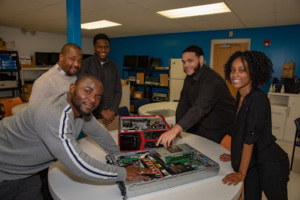 Another way for tech companies to promote their workforce diversity is to develop their talent pools from the inside out, by offering upskilling and specified training programs designed to create representation, as well as opportunities for those who may have otherwise been overlooked. Tech is a fast-growing, constantly evolving field. By upskilling existing employees or groups of employees in needed areas, a tech company benefits itself by staying up-to-date and responsive to tech and market trends and benefits its employees by increasing their skillsets, experience, and earning potential. This practice also provides pathways to success for employees of all backgrounds and skill levels.
Another way for tech companies to promote their workforce diversity is to develop their talent pools from the inside out, by offering upskilling and specified training programs designed to create representation, as well as opportunities for those who may have otherwise been overlooked. Tech is a fast-growing, constantly evolving field. By upskilling existing employees or groups of employees in needed areas, a tech company benefits itself by staying up-to-date and responsive to tech and market trends and benefits its employees by increasing their skillsets, experience, and earning potential. This practice also provides pathways to success for employees of all backgrounds and skill levels.
Finally, beyond hiring and training, it is important for a workplace to support and facilitate the growth and development of its budding tech talent by providing mentorship opportunities. Mentorships can help fresh learners make connections, grow their skills, gain confidence, and ultimately pave the way for growth and success in their respective career paths. If done right, this can have the effect of increasing productivity and work quality, while also boosting minority inclusion and representation in the workplace.
How Per Scholas Increases Diversity for Employers
Studies have shown that organizations ranking high in internal ethnic, age, gender, and cultural diversity regularly and significantly outperform their industry peers in terms of financial returns and employee satisfaction. “More diverse companies, we believe, are better able to win top talent and improve their customer orientation, employee satisfaction, and decision making, and all that leads to a virtuous cycle of increasing return,” a recent McKinsey report stated. The business case for diversity is strong, as is the social one. It is now up to companies to put in the work to improve the diversity of their workforces, and Per Scholas is happy to help along the way.
Since its launch in 2016, Per Scholas’ Diverse by Design initiative works with employers to open a solutions-driven conversation about DEIB in tech. Initially launched as a conversation series, Diverse by Design strives to create “a space where leaders in tech and workforce development [can] come together to discuss and share best practices to attract, retain and develop skilled black and brown tech professionals.” Diverse by Design events regularly gather hundreds of attendees in cities all across the country. The initiative is led by a National Advisory Board composed of members from a wide variety of tech-adjacent organizations.
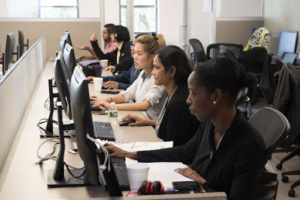
Through thoughtful, focused discussion and personalized input from DEIB experts, Diverse by Design seeks to enable C-suite leaders to make valuable and socially impactful business decisions. Diverse by Design also provides organizations with access to customized training tracks and talent sourcing solutions that allow a company to meet their own talent demands while simultaneously transforming the diversity landscape within their company.
Ignite a Passion for Tech with Diverse Learners
Per Scholas is committed to preparing individuals typically underrepresented in the tech industry for successful careers in tech. An important part of this process, beyond simply preparing learners to launch their careers, is showing people from various minority-in-tech backgrounds that success is possible for them in the tech field, and opening pathways for them to succeed. Per Scholas learners of various ages, gender identities, races, ethnicities, physical abilities, and backgrounds have been able to find success through Per Scholas courses and subsequently launching tech careers. No one should be barred from pursuing a career in tech due to a lack of connection, and the success of our learners serves to encourage others to apply, breaking down barriers to entry in tech.
Many of our female learners expressed an initial hesitation in entering such a historically male-dominated field, prior to taking Per Scholas courses. However, our courses, which typically possess a high percentage of female learners, quickly break down preconceived stereotypes and show women that they can be heard, respected, and successful in tech. Per Scholas Newark learner Dekontee Milfort reflected that she saw the tech industry as one for men, that the men in her family worked in tech, but not any women. “I felt like the IT world was mostly for guys. A lot of the guys in my family – that was the job they were doing. It was a heavily-male role. A friend of mine talked to me about Per Scholas and their diverse graduates, and after looking on the website at all of the graduates, I knew this was the training for me.”
More seasoned technologists also face discrimination in the tech industry, primarily due to ageism. Many believe that tech is a “young person’s field,” and that older individuals cannot be successful in IT. This is, of course, a totally false assumption and, with the proper training, upskilling, and guidance, those individuals can be just as successful as their younger counterparts. This is proven true over and over by our many brilliant mature learners, who achieve great things both in and beyond our courses. Antwan Grant, who graduated from Per Scholas Atlanta’s Software Engineering course in 2021, had initially begun her tech career in 2000. She had not been able to upskill since then and had been stuck doing back-end work that she did not enjoy. “Being in the IT world for as long as I have been, you can get stuck,” Antwan, who worried that her age would keep her from advancing in tech, reflected. “Fast-forward 3 months and I have graduated from Per Scholas! I felt so accomplished with everything I was able to figure out – I know now that I can do this! With my old skill set, no one would hire me. Since graduating from Per Scholas, I have had people contact me for jobs right here in Atlanta.”
I am very grateful; not only for the opportunities that Per Scholas has presented to me but for the opportunities that they provide to people in communities that don’t have the same opportunities that other communities have.— Moja Chatman, Per Scholas New York Graduate
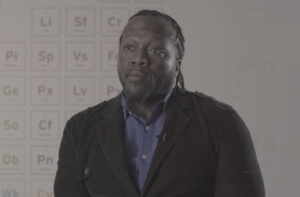 Our learners are all talented and driven individuals, many of them simply lacked prior opportunities to become involved in tech. Moja Chatman, a recent graduate of our Bronx AWS/reStart course, is a born and raised New Yorker. He was always interested in tech but never had the opportunity to pursue it professionally until he came across Per Scholas. Moja landed a job shortly after graduating and is thankful for the doors his training was able to open for him, and others like him. “I am very grateful, not only for the opportunities that Per Scholas has presented to me but for the opportunities that they provide to people in communities that don’t have the same opportunities that other communities have,” Moja reflected.
Our learners are all talented and driven individuals, many of them simply lacked prior opportunities to become involved in tech. Moja Chatman, a recent graduate of our Bronx AWS/reStart course, is a born and raised New Yorker. He was always interested in tech but never had the opportunity to pursue it professionally until he came across Per Scholas. Moja landed a job shortly after graduating and is thankful for the doors his training was able to open for him, and others like him. “I am very grateful, not only for the opportunities that Per Scholas has presented to me but for the opportunities that they provide to people in communities that don’t have the same opportunities that other communities have,” Moja reflected.
Ultimately, the promotion of diversity, equity, inclusion, and belonging in the tech workplace begins with opportunity and intentionality. The IT field still has a long way to go in order to become a totally diverse and inclusive community, but it is certainly headed in the right direction. Per Scholas is committed to being a driver of this change, transforming the face of technology by opening pathways of opportunity for diverse talent and helping other organizations to do the same. As a champion of diversity, DEIB is in our DNA.
Per Scholas Celebrates Black History Month
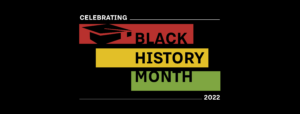
During Black History Month, Per Scholas has been proud to engage in various internal and external activities to communicate the importance of Black individuals in the tech workplace. Keeping the Association for the Study of African American Life and History’s (ASALH) theme of Black Health and Wellness in mind, we focused on wellness throughout our Black History Month celebrations and meetings and resurfaced some key conversations from our Diverse by Design podcast.
Throughout the month, we shared stories of some of our Black learners on our social media pages, highlighting their experience as Black individuals in an industry they’ve previously been underrepresented. Namely, we resurfaced the story of Per Scholas National Capital Region graduate Serge Mavuba. Serge, an AWS re/Start graduate, had some challenges throughout his training that he opened up about with us in a candid interview. He discussed how mental health is not typically discussed in his culture, especially as a Black man. Serge reflected, “mental health wasn’t discussed in my culture; it was taboo. I didn’t know what I needed, but with the Learner Support Team, I was able to recognize my triggers and implement ways to redirect my emotions to push through the day.” He was able to help himself by seeking help and sharing his thoughts with others, one of the ways to address mental health. By sharing his story, he gave Black individuals an opportunity to start the conversation on wellness in the Black community.

Internally, Per Scholas shared different experiences from our team and hosted a virtual lunch centered around mental health and wellness. Kiva Harper, LCSW-S joined us to discuss mental health, wellness tips, and how to be more compassionate towards others. Her insight helped open up the conversation for our team on wellness and mental health for Black individuals.
Lastly, we resurfaced some of our Diverse by Design Podcast episodes featuring Black leaders to showcase their stories and experiences. Franklin Reed, Chair of Diverse by Design’s National Advisory Board and Executive Director of Inclusion and Diversity at TEKsystems, walked through the mechanics of operationalizing diversity and inclusion within an organization in his featured podcast. Another podcast we shared again was that of Shawn Harris, Success Engineer at Cypress.io, where she reflected on her experience as a recent cancer survivor, Black woman, and proud member of the LGBTQ+ family. Listen as she thinks back on her experience with inclusion and belonging in tech.
We are honored that we were able to further explore and celebrate the stories and experiences of our learners, staff, and partners this Black History Month as we continue to highlight diversity in our organization.
Per Scholas Learner Featured on CBS Sunday Morning
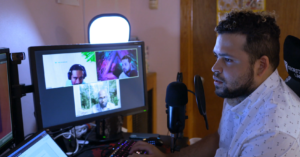
CBS News featured Per Scholas learner, Richard Escotto on their Sunday Morning program. The feature focused on how many industries and labor markets are looking for employees following the pandemic and where those employees are working now. Richard Escotto mentioned that after he lost his restaurant job at the beginning of the pandemic, he decided to change career paths into technology. “[The pandemic] did give me an opportunity that was rare and probably was never going to happen, and sometimes you just have to seize that,” Richard reflected.
Richard Escotto is set to graduate from Per Scholas New York in October 2021 from our Cybersecurity course.
Per Scholas Atlanta Graduates Gain Industry Knowledge Through Capgemini’s Internship Program
Per Scholas has been a leader in connecting our learners with the skills and career development needed to pursue and land an IT career, however, opportunities like those which Capgemini provides have made it possible for our graduates to receive additional hands-on training and opportunities from their robust internship program. Many Per Scholas graduates from Atlanta, and additional cities nationwide, have joined Capgemini as paid interns and become full-time team members after learning more about the IT industry, gaining industry experience, and meeting with mentors. These opportunities are a great bridge between our tech training and industry experience for our learners and graduates.
Rachel Powe graduated from Per Scholas Atlanta in 2020 and is now a Junior Software Engineer at Capgemini. She initially started as an intern at Capgemini, but quickly moved into her current position with her tenacity and passion for technology. Rachel noted that there wasn’t a big push for women in tech when she was attending college, so she didn’t pursue a technology path. Once she graduated from Per Scholas’s Software Engineering course, however, she went into her internship role and was given the opportunity to build her knowledge base, her technical skills, and complete additional certifications through Capgemini.
Rachel reflects, “I would definitely recommend Per Scholas’ training and Capgemini’s internship program, especially for someone that is just starting their career in tech because it will help you identify what you want to do with your career and expose you to the other aspects of being a developer.” Rachel took advantage of every opportunity she had because of her tenacity during her training with Per Scholas and Capgemini. “I don’t think I would have been in this position so soon after graduating if it weren’t for Per Scholas, the partnerships they have, and how much they wanted us to succeed.”
Another Per Scholas learner that benefitted from Capgemini’s internship program was Kemazee Cooper. Kemazee is currently a Support Technician Lead at Capgemini in Atlanta. He was always interested in technology as one of the most prosperous career paths and often found himself fixing phones and computers for friends growing up. Before applying for Per Scholas and considering a tech career, Kemazee was a social worker for a nonprofit organization and decided to start considering IT roles. Once enrolled in Per Scholas’ training, the COVID-19 pandemic hit, and as a result, training became remote. Kemazee was able to stay disciplined throughout the training and focus on his skills. 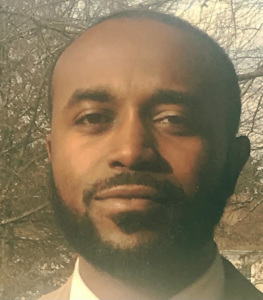 Once he graduated, Kemazee accepted an internship with Capgemini where he learned more about the field and different aspects of technology and was eventually hired into a full-time position. “Per Scholas prepared me for situations I may see in the field as we went through a lot of scenarios, workshops, and labs,” he recalled. Next, Kemazee plans to earn an AWS certification and aims to become a mentor for others interested in tech, options he is considering after his experience with Capgemini’s internship program.
Once he graduated, Kemazee accepted an internship with Capgemini where he learned more about the field and different aspects of technology and was eventually hired into a full-time position. “Per Scholas prepared me for situations I may see in the field as we went through a lot of scenarios, workshops, and labs,” he recalled. Next, Kemazee plans to earn an AWS certification and aims to become a mentor for others interested in tech, options he is considering after his experience with Capgemini’s internship program.
A model such as that with Capgemini, following training courses from Per Scholas, is one that is setting technology career-seeking individuals in Atlanta up for success. Not only are our graduates obtaining technical skills and career development knowledge, but they are also gaining industry experience with mentors through Capgemini’s internship program and advancing economic mobility in Atlanta.
Toyota Grant Powers Dallas Cybersecurity Cohort
This July, Per Scholas’s Dallas campus will be graduating its second cohort of a new cybersecurity course, made possible by a generous $350,000 grant from Toyota, a champion Per Scholas partner since 2020.
The course was conceptualized before the start of the Covid pandemic and, in addition to a software engineering course, was one of two new courses introduced for Dallas learners during the pandemic.
The course has played a tremendous role in increasing the number of women being trained at the Dallas campus, a long-time goal of Stephanie Valadez, the Per Scholas Dallas Managing Director. The initial cybersecurity cohort was composed of 61% women, bringing the Dallas campus to a current total of 40% women enrolled in 2020, a significant increase from previous years and, Valadez believes, a sign of tremendous success in recruiting women — a strong departure from the typically male-dominated tech field.
Valadez was particularly instrumental in designing the course, and partnering with the instructional team to build the course’s rigorous curriculum, which includes 15-weeks of CompTIA CYSA+ training and certification, customer service and professional development training, and more.
In order to ensure that the curriculum of the course met the needs of employers, a roundtable discussion was held with employers in February of 2020 at the Toyota North America Headquarters in Plano, TX. At this discussion, Per Scholas reviewed the curriculum with cybersecurity executives at 10 different companies, including Toyota, AT&T, Checkpoint, Pepsi Co., and Stack Path, and talked about what they hoped to achieve with course training.
“We had the roundtable discussion with employers to make sure that we were putting forth a strong curriculum that was going to mirror what they needed within their businesses,” Valadez said. “[The curriculum] was truly employer-informed.”
The course grant was designed to fund two cohorts of a cybersecurity course, as well as the creation of an Education Security Operations Center (ESOC) housed at the Downtown Dallas campus, which would provide the equipment and environment to mirror what learners would experience in the workplace.
Due to the pandemic, the center has not yet been built, but there are plans to complete the buildout later this year. Fortunately, course instructors Wycliffe Ikobe and Kayla Mejire (both graduates of Per Scholas Dallas themselves) have been able to leverage digital tools to mimic a similar environment and provide learners with all necessary experience.
Frederick Tsa, a graduate of the cybersecurity course’s first cohort, has been working in the cyber intelligence department of JP Morgan Chase for a few months now. Before Per Scholas, Tsa had an extensive academic background and had worked in a variety of different roles, but had no real experience with cybersecurity. During the pandemic, the company he was working at was having difficulties, and Tsa felt it was time for a change. He was interested in learning something new and pursuing cybersecurity, and he came across the Per Scholas course.
“What Per Scholas gave me was that ambition,” Tsa said. “Getting that industry certification and that training to be able to understand the basics of cybersecurity operations was something that helped me secure my job. From Per Scholas I learned a lot to the point where I was able to articulate that during the interviews and be able to make concise arguments to the point where I was offered the position.”
Athipong Yimsiriwattana, another graduate from Dallas’s first cybersecurity cohort, was working as a fleet service clerk for American Airlines until he was laid off due to the pandemic. Struggling to make ends meet, Yimsiriwattana decided to pursue a lifelong interest in technology and take Per Scholas’s free cybersecurity training course.
The salary for cybersecurity analysts is significantly higher than what Yimsiriwattana was making in his previous role, and he is currently interviewing for roles. “I will be doing something I love doing,” Yimsiriwattana told USA Today in an interview earlier this year about his incredible experience. With support from Toyota and the grant used for our Cybersecurity course, our graduates, like Yimsiriwattana, are able to take their careers to the next level and get the certifications needed to secure a job they are passionate about.
Comcast NBCUniversal Features Per Scholas Graduate, Ampire Ndusha, in 2021 Impact Report
Per Scholas Aims to Lower New York’s Unemployment Rate with Tech Training
1,000 Careers Update – Learners are Excelling Because of You!
Dayna and Sadaf are two of hundreds of Per Scholas learners who received tech toolkits as part of our 1,000 Careers Campaign.
Dayna Thomas Tucker, a Per Scholas learner, has personally benefited from the Raspberry Pi toolkit she received. The working mother of two has had a passion for technology and computers since she was young and would work on computers in school to try to figure out how they worked.

We recently connected with Dayna, who reflected, “I received the Raspberry Pi toolkit and gave me access to hands-on experience that I needed. The Raspberry Pi is Linux based and Linux was not something that I was used to. I had to rely solely on commands and learn codes. It was an interesting and fun way for us to learn a new system that was not like my Windows computer. It was definitely something different, but a great experience for someone like myself that has never worked with that type of system before.” Dayna is currently completing her End User Desktop Support training and is set to graduate in June with her eyes set on a technology career.
Another example of how these tech toolkits and laptops assisted in our learner’s success is that of Sadaf Haroon, who received a Macbook for her training. Sadaf obtained her Bachelor’s Degree in Computer Science originally, but had a gap in her employment once she became a mother. Eager to return to the industry, she looked into Per Scholas’s training as a way to get back and freshen up her skills.

Now a Software Engineer at AT&T, Sadaf initially received multiple job offers within a week of graduation and mentioned how her training and career development at Per Scholas connected her with her current position. Sadaf, an immigrant mother of three, was at first intimidated to resume a career in a thriving field as Tech. “Per Scholas made it easier for me to learn and now I am an earning member of my family. What can be greater than that?”
When we had the chance to chat with Sadaf, she shared, “It was a great initiative to provide the laptop. I was able to keep up with online learning and materials covered in my course since the computer came equipped with everything I needed that was up to date according to the program. It was also exciting to pick up the device and meet according to CDC guidelines.”
The impact of these toolkits is clear – enabling hundreds of learners to pursue training and open doors to high-growth careers in tech.
